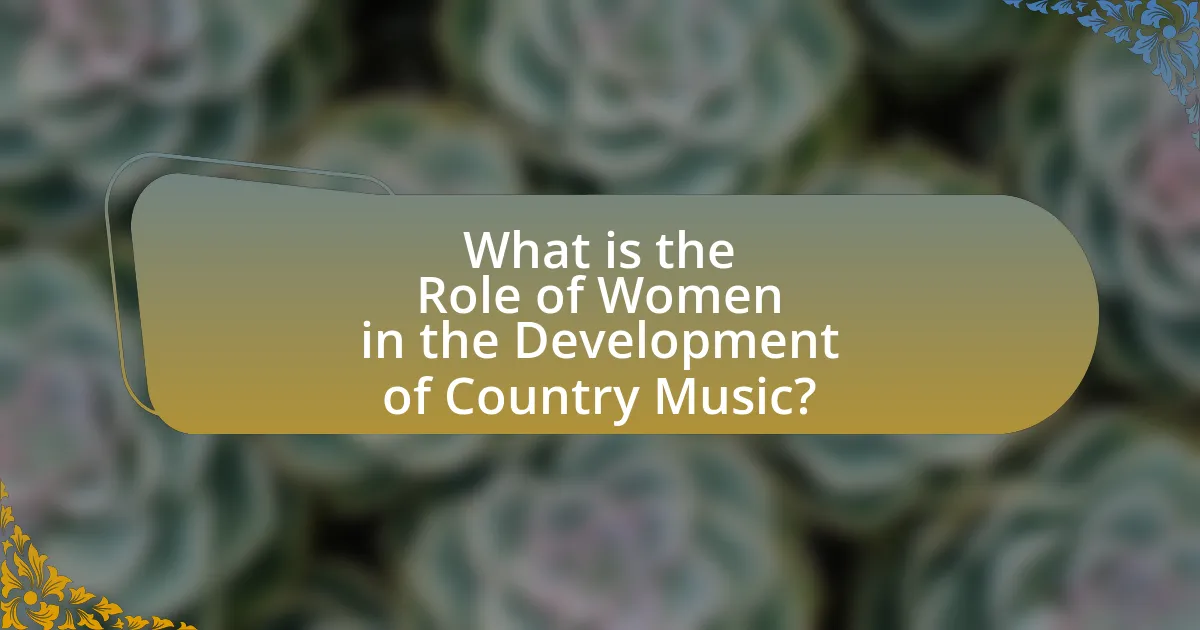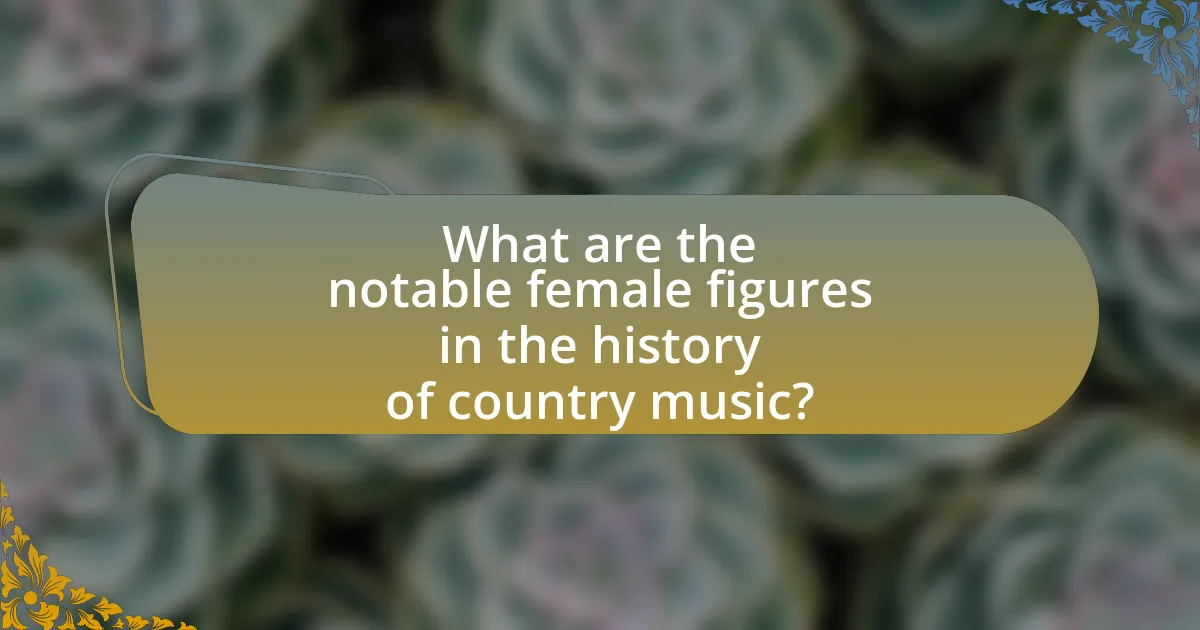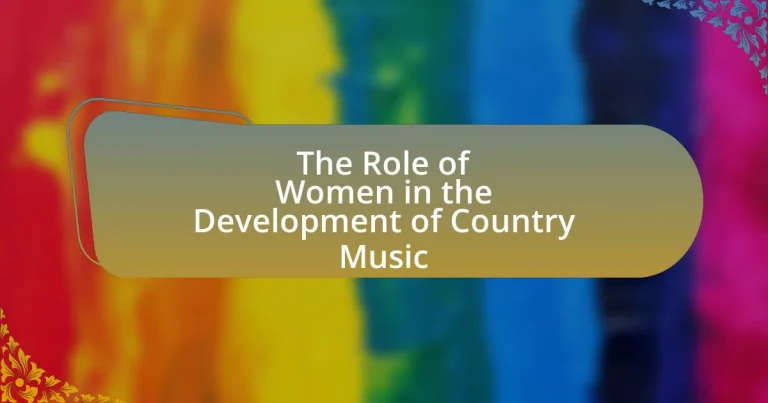The article examines the significant role of women in the development of country music, highlighting their contributions as artists, songwriters, and industry leaders. It discusses the influence of pioneering figures such as the Carter Family, Patsy Cline, and Dolly Parton, who shaped the genre’s sound and themes, addressing social issues and personal narratives. The article also explores how contemporary female artists like Kacey Musgraves and Maren Morris continue to challenge stereotypes and expand the representation of women in country music. Additionally, it emphasizes the importance of recognizing women’s contributions to ensure a more inclusive understanding of the genre’s history and ongoing evolution.

What is the Role of Women in the Development of Country Music?
Women have played a crucial role in the development of country music, significantly influencing its evolution and popularity. Pioneers like the Carter Family and Maybelle Carter introduced harmonies and guitar techniques that shaped the genre’s sound. Additionally, artists such as Patsy Cline and Dolly Parton brought emotional depth and storytelling to their music, expanding the audience and appeal of country music. The inclusion of female perspectives and experiences has enriched the lyrical content, making it more relatable to diverse audiences. Furthermore, women have contributed to the industry as songwriters, producers, and executives, helping to break barriers and promote gender equality within the genre. Their impact is evident in the continued success of female artists in country music today, demonstrating their integral role in its ongoing development.
How have women influenced the evolution of country music?
Women have significantly influenced the evolution of country music by shaping its themes, styles, and cultural narratives. Pioneering artists like Loretta Lynn and Dolly Parton introduced strong female perspectives, addressing issues such as gender roles, love, and personal struggle, which resonated with audiences and expanded the genre’s emotional depth. Additionally, women like June Carter Cash and Emmylou Harris contributed to the genre’s sound and authenticity, blending traditional country with folk and rock influences. Their contributions have not only enriched the musical landscape but also paved the way for future female artists, leading to a more inclusive and diverse representation in country music.
What key contributions have women made to the genre’s sound and style?
Women have significantly shaped the sound and style of country music through their songwriting, vocal techniques, and instrumental contributions. Pioneers like Loretta Lynn and Dolly Parton introduced narratives that highlighted women’s experiences, influencing lyrical content and thematic depth. Additionally, artists such as Emmylou Harris and Shania Twain expanded the genre’s sound by incorporating elements from rock and pop, thus broadening its appeal. The presence of female musicians in the industry has also led to the inclusion of diverse instrumentation, with women playing crucial roles in both traditional and contemporary settings. These contributions have not only enriched the genre but have also paved the way for future generations of female artists.
How have female artists shaped the themes and narratives in country music?
Female artists have significantly shaped the themes and narratives in country music by introducing diverse perspectives on love, heartbreak, empowerment, and social issues. Pioneers like Loretta Lynn and Dolly Parton have addressed topics such as gender roles and personal struggles, influencing the genre’s storytelling. For instance, Lynn’s song “The Pill” challenged societal norms regarding women’s reproductive rights, while Parton’s “Jolene” explores themes of jealousy and vulnerability. Additionally, contemporary artists like Kacey Musgraves and Miranda Lambert continue this tradition by incorporating modern issues such as mental health and self-acceptance into their music, thereby expanding the narrative scope of country music. This evolution reflects a broader cultural shift and highlights the essential role of female artists in shaping the genre’s identity.
Why is the recognition of women’s contributions important in country music history?
The recognition of women’s contributions is crucial in country music history because it highlights their significant impact on the genre’s evolution and cultural relevance. Women have played pivotal roles as artists, songwriters, and producers, shaping the sound and narrative of country music. For instance, artists like Loretta Lynn and Dolly Parton not only achieved commercial success but also addressed social issues through their music, influencing generations. Furthermore, studies indicate that female artists have contributed to a more diverse representation within the genre, enriching its storytelling and emotional depth. Acknowledging these contributions ensures a more accurate and inclusive understanding of country music’s history and its ongoing development.
What impact does acknowledging women’s roles have on the genre’s legacy?
Acknowledging women’s roles significantly enhances the legacy of country music by recognizing their contributions to the genre’s evolution and cultural richness. Women like Loretta Lynn and Dolly Parton have not only shaped the sound of country music but also influenced its themes, addressing issues such as gender equality and personal empowerment. Their visibility and success challenge traditional gender norms within the industry, paving the way for future female artists. This acknowledgment fosters a more inclusive narrative, ensuring that the history of country music reflects the diverse voices that have contributed to its development, thereby enriching its legacy and cultural significance.
How does this recognition influence contemporary country music?
Recognition of women in country music significantly influences contemporary country music by promoting diversity and encouraging female representation in the genre. This acknowledgment leads to increased visibility for female artists, resulting in a broader range of themes and narratives in songs. For instance, the success of artists like Kacey Musgraves and Maren Morris showcases how female perspectives are reshaping the genre, leading to more inclusive storytelling. Furthermore, studies indicate that female artists who receive recognition often inspire younger generations, fostering a new wave of talent that continues to challenge traditional norms within country music.

What are the notable female figures in the history of country music?
Notable female figures in the history of country music include Loretta Lynn, Dolly Parton, and Patsy Cline. Loretta Lynn is recognized for her groundbreaking songs that addressed women’s issues, such as “Coal Miner’s Daughter,” which became an anthem for female empowerment in the genre. Dolly Parton, a prolific songwriter and performer, has had a significant impact on country music with hits like “Jolene” and “9 to 5,” showcasing her versatility and influence. Patsy Cline is celebrated for her emotive voice and crossover appeal, with classics like “Crazy” and “I Fall to Pieces,” which helped pave the way for future female artists in country music. These women not only shaped the sound of country music but also expanded its themes and audience.
Who are the pioneering women in country music?
The pioneering women in country music include artists such as the Carter Family, particularly Maybelle Carter, who was instrumental in shaping the genre’s sound with her innovative guitar playing. Another significant figure is Patsy Cline, whose emotive singing style and crossover appeal in the 1950s and 1960s helped to elevate the status of women in the industry. Additionally, Loretta Lynn broke barriers with her songwriting that addressed women’s issues, while Dolly Parton became a cultural icon known for her songwriting and business acumen. These women not only contributed to the musical landscape but also paved the way for future generations of female artists in country music.
What were the significant achievements of these early female artists?
Early female artists in country music achieved significant milestones, including breaking gender barriers and influencing the genre’s evolution. Notable figures like Maybelle Carter and Kitty Wells paved the way for women in a predominantly male industry, with Carter’s innovative guitar playing and Wells’ chart-topping hits challenging societal norms. Additionally, artists such as Patsy Cline brought emotional depth to the genre, leading to greater acceptance of female voices in country music. Their contributions not only shaped the sound of country music but also inspired future generations of female artists, establishing a legacy that continues to resonate today.
How did their work pave the way for future generations of women in the genre?
The work of pioneering women in country music established a foundation that empowered future generations by breaking gender barriers and creating opportunities for female artists. Notable figures like Loretta Lynn and Dolly Parton challenged societal norms through their songwriting and performances, addressing themes of female empowerment and personal struggle. Their success demonstrated that women could achieve commercial viability in a male-dominated industry, leading to increased visibility and acceptance of female artists. This paved the way for subsequent generations, as evidenced by the rise of artists like Miranda Lambert and Kacey Musgraves, who continue to draw inspiration from their predecessors while further expanding the genre’s boundaries.
Which contemporary female artists are shaping the future of country music?
Contemporary female artists shaping the future of country music include Kacey Musgraves, Maren Morris, and Brandi Carlile. Kacey Musgraves has won multiple Grammy Awards, including Album of the Year for “Golden Hour,” showcasing her innovative approach to country music that blends traditional elements with modern themes. Maren Morris gained recognition with her hit “My Church,” which earned her a Grammy Award and highlights her ability to connect with a diverse audience. Brandi Carlile, known for her powerful songwriting and vocal prowess, has also received critical acclaim, including Grammy Awards for her album “By the Way, I Forgive You,” further solidifying her influence in the genre. These artists are not only redefining country music but also expanding its reach and relevance in contemporary culture.
What styles and innovations are these artists bringing to the genre?
Artists in the country music genre are bringing diverse styles and innovations, such as blending traditional country with pop, rock, and folk influences. For instance, artists like Kacey Musgraves incorporate contemporary themes and sounds, which challenge conventional narratives within the genre. Additionally, women like Miranda Lambert and Maren Morris are known for their storytelling prowess, often addressing personal and social issues, thereby expanding the thematic scope of country music. This evolution is evidenced by the rise of sub-genres like Americana and the increasing presence of female artists in mainstream country charts, reflecting a shift towards inclusivity and modernity in the genre.
How are they addressing social issues through their music?
Women in country music address social issues through their lyrics and public personas by highlighting themes such as gender equality, domestic violence, and empowerment. For instance, artists like Loretta Lynn and Miranda Lambert have tackled topics like women’s rights and personal struggles in their songs, bringing attention to societal challenges. Lynn’s song “The Pill” openly discusses reproductive rights, while Lambert’s “Gunpowder & Lead” addresses domestic abuse, illustrating how their music serves as a platform for social commentary and advocacy.
How have societal changes influenced women’s roles in country music?
Societal changes have significantly influenced women’s roles in country music by expanding their opportunities for creative expression and leadership within the genre. Historically, women in country music faced limitations, often relegated to supporting roles or traditional themes of love and heartache. However, the feminist movements of the 1960s and 1970s challenged these norms, leading to greater visibility and acceptance of female artists. For instance, artists like Loretta Lynn and Dolly Parton broke barriers by addressing social issues and asserting their independence in their music. This shift was further supported by changing societal attitudes towards gender equality, which allowed women to take on more diverse roles, from songwriters to producers. As a result, the representation of women in country music has evolved, with contemporary artists like Kacey Musgraves and Maren Morris continuing to push boundaries and redefine the genre.
What historical events have impacted women’s participation in the genre?
Women’s participation in country music has been significantly impacted by historical events such as the women’s suffrage movement, World War II, and the feminist movement of the 1960s and 1970s. The women’s suffrage movement, which culminated in the 19th Amendment in 1920, empowered women to assert their rights and pursue careers in various fields, including music. During World War II, many women entered the workforce and took on roles traditionally held by men, leading to increased visibility and acceptance of female artists in the music industry. The feminist movement further challenged gender norms, advocating for equal opportunities and representation in all sectors, including country music, which allowed artists like Loretta Lynn and Dolly Parton to gain prominence and influence. These events collectively fostered an environment that encouraged and supported women’s contributions to the genre.
How did the feminist movements affect female representation in country music?
Feminist movements significantly enhanced female representation in country music by advocating for women’s rights and visibility in the industry. During the 1970s and 1980s, the women’s liberation movement encouraged female artists to assert their identities and challenge traditional gender roles, leading to the emergence of influential figures like Loretta Lynn and Dolly Parton, who addressed social issues in their music. Research indicates that the increased visibility of female artists during this period resulted in a notable rise in the number of women charting on country music charts, with female representation increasing from 10% in the 1970s to over 30% by the 1990s. This shift not only allowed for a broader range of female narratives in country music but also paved the way for future generations of women in the genre.
What role did the civil rights movement play in shaping women’s voices in the genre?
The civil rights movement significantly amplified women’s voices in country music by fostering an environment of social change and empowerment. This movement encouraged women to assert their identities and express their experiences through music, leading to the emergence of influential female artists who addressed themes of equality and social justice. Notable figures like Loretta Lynn and Dolly Parton used their platforms to challenge societal norms and advocate for women’s rights, reflecting the broader struggles of the civil rights era. The intersection of these movements allowed women in country music to gain visibility and assert their narratives, ultimately reshaping the genre’s landscape.
How do cultural perceptions of women affect their roles in country music today?
Cultural perceptions of women significantly influence their roles in country music today by shaping the themes, representation, and opportunities available to female artists. Historically, women in country music have often been portrayed through traditional gender roles, emphasizing themes of love, heartbreak, and domesticity, which can limit their artistic expression. For instance, artists like Miranda Lambert and Kacey Musgraves challenge these stereotypes by incorporating narratives of empowerment and independence in their music, reflecting a shift in societal attitudes towards women’s roles. Additionally, the increasing visibility of female artists in mainstream country music charts, as evidenced by the success of women in award nominations and wins, indicates a growing acceptance and recognition of diverse female perspectives. This evolution in cultural perception not only enhances the representation of women in the genre but also encourages a broader acceptance of varied themes and stories that resonate with contemporary audiences.
What stereotypes do female artists face in the industry?
Female artists in the country music industry face stereotypes that question their authenticity and musical abilities, often being perceived as less serious or credible than their male counterparts. This perception is reinforced by a historical bias that associates country music with masculinity, leading to assumptions that women are primarily entertainers rather than skilled musicians or songwriters. For instance, a study by the Country Music Association found that only 16% of songs played on country radio were by female artists, highlighting the systemic barriers they encounter. Additionally, female artists often face pressure to conform to traditional gender roles, which can limit their artistic expression and opportunities within the industry.
How are women challenging these stereotypes through their music and performances?
Women are challenging stereotypes in country music by asserting their individuality and addressing social issues through their lyrics and performances. Artists like Kacey Musgraves and Miranda Lambert use their platforms to discuss topics such as gender equality, personal empowerment, and mental health, which defy traditional expectations of female roles in the genre. For instance, Musgraves’ album “Golden Hour” won a Grammy for its progressive themes and authenticity, showcasing how women can redefine narratives within country music. Additionally, performances by artists like Carrie Underwood often emphasize strength and resilience, further dismantling the stereotype of women as passive figures in the industry. These actions collectively illustrate a significant shift in the portrayal of women in country music, moving towards a more empowered and multifaceted representation.
What practical steps can be taken to support women in country music?
To support women in country music, industry stakeholders can implement mentorship programs that connect emerging female artists with established professionals. These programs can provide guidance, networking opportunities, and resources that are crucial for career development. Research indicates that mentorship significantly enhances career advancement, particularly for women in male-dominated fields like country music, where only 16% of chart-topping songs in 2020 featured female artists, according to the Country Music Association. Additionally, promoting female-led festivals and events can create platforms for women to showcase their talent, thereby increasing visibility and opportunities. Supporting initiatives that advocate for equitable representation in radio play and award nominations is also essential, as studies show that increased visibility leads to greater success for female artists.
How can industry stakeholders promote female talent in country music?
Industry stakeholders can promote female talent in country music by implementing targeted initiatives such as mentorship programs, equitable funding opportunities, and increased visibility in media. For instance, organizations like the Country Music Association have launched initiatives aimed at supporting women in the industry, which can lead to greater representation and success for female artists. Additionally, research from the Annenberg Inclusion Initiative highlights that women are significantly underrepresented in country music, indicating a need for stakeholders to actively create platforms that showcase female talent, thereby fostering a more inclusive environment.
What initiatives exist to empower women in the country music scene?
Initiatives that empower women in the country music scene include organizations like the Country Music Association’s (CMA) “CMA Foundation,” which supports music education and provides scholarships specifically for women. Additionally, the “Women in Country Music” initiative promotes female artists through networking events and showcases, aiming to increase visibility and opportunities for women in the industry. The “Song Suffragettes” collective also plays a crucial role by providing a platform for female songwriters to perform and collaborate, thereby fostering a supportive community. These initiatives collectively aim to address gender disparities and enhance the representation of women in country music.


